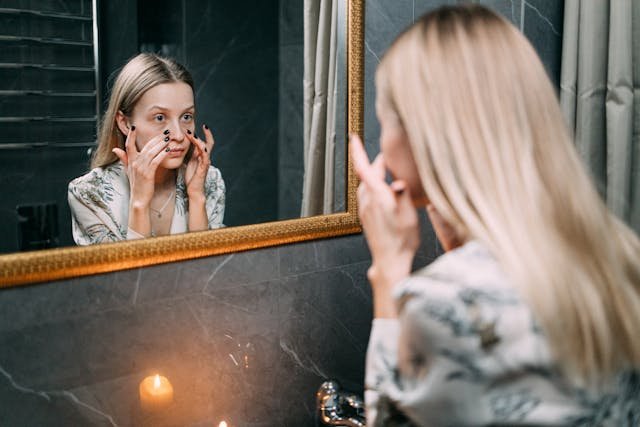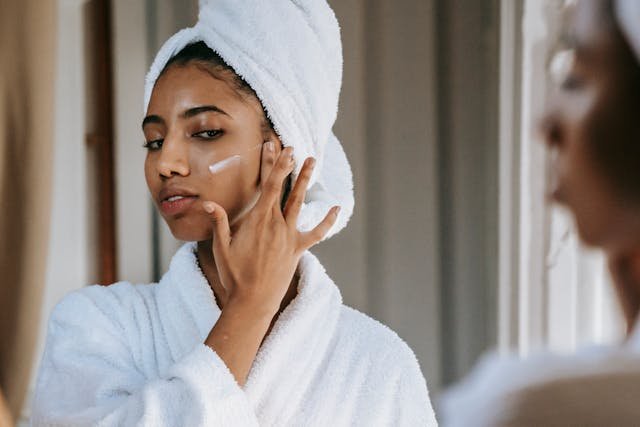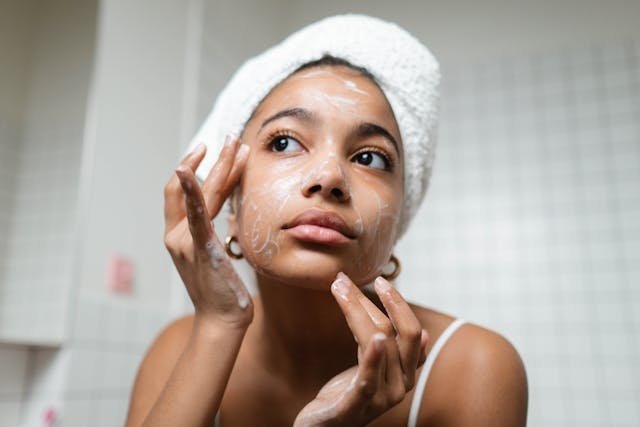Skipping sunscreen and over-exfoliating are common skincare mistakes. These errors can lead to premature aging and skin irritation.
Achieving healthy, glowing skin requires more than just using the right products. Avoiding common skincare mistakes is crucial to maintaining a clear and youthful complexion. Many people unknowingly harm their skin by skipping essential steps or using products incorrectly. Simple changes in your daily routine can make a significant difference.
Understanding these common pitfalls helps you create an effective and beneficial skincare regimen. From using sunscreen daily to choosing the right exfoliant, small adjustments can lead to significant improvements. Prioritize your skin’s health by staying informed and making smarter skincare choices.
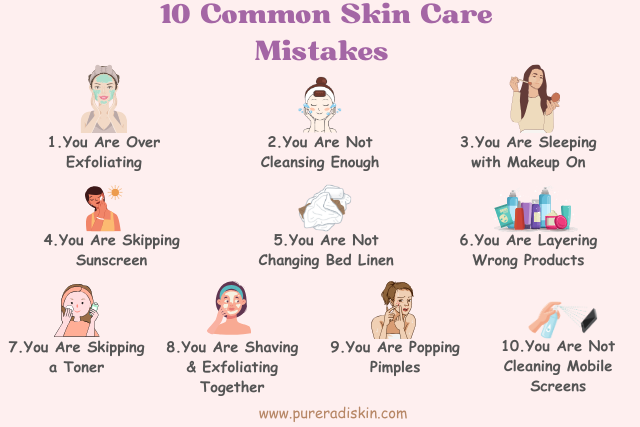
Skipping Sunscreen
Many people skip sunscreen, not knowing it harms their skin. Sunscreen is vital for protecting against UV rays. Skipping it leads to sunburn, aging, and even skin cancer.
Daily Protection
Apply sunscreen every day, even when it’s cloudy. UV rays penetrate clouds and damage skin.
Use at least SPF 30 for effective protection. Reapply every two hours, especially when outdoors.
Cover all exposed skin, including face, neck, and hands. Don’t forget ears and feet.
Choose broad-spectrum sunscreen
Look for water-resistant options
Check expiration dates
Seasonal Misconceptions
Many believe sunscreen is only for summer. This is a big mistake. UV rays affect skin in all seasons.
Winter sun can be just as harmful. Snow reflects UV rays, increasing exposure.
Wear sunscreen during winter sports like skiing and snowboarding. Protect your skin year-round.
Season | Sun Protection Tip |
|---|---|
Summer | Use SPF 50, wear hats and sunglasses |
Winter | Use SPF 30, wear protective gear |
Spring | Apply SPF 30, wear lightweight clothing |
Autumn | Continue using SPF 30, moisturize well |
Over-exfoliating
Over-exfoliating is a common skincare mistake. It can harm your skin. Many believe that exfoliating daily leads to glowing skin. This is not true. Over-exfoliating can damage your skin.
Skin Barrier Damage
Over-exfoliating can cause skin barrier damage. The skin barrier protects your skin. It keeps moisture in and harmful things out. Damaging this barrier leads to problems. Your skin becomes dry, red, and irritated.
Signs of skin barrier damage include:
Redness
Flakiness
Sensitivity
Safe Exfoliation Practices
To avoid damage, follow safe exfoliation practices. Exfoliate 2-3 times a week. Use gentle exfoliants. Avoid harsh scrubs. Choose products with salicylic acid or lactic acid. These ingredients are gentle on the skin.
Here are some tips:
Use a soft washcloth.
Apply gentle pressure.
Moisturize after exfoliating.
Ignoring Your Neck
Many people focus on their face while ignoring their neck. This is a common mistake in skincare routines. The neck is as important as the face. It shows signs of aging and damage quickly.
Neck Care Tips
Cleanse: Use a gentle cleanser on your neck every day.
Moisturize: Apply a rich moisturizer to keep the skin hydrated.
Sunscreen: Always apply sunscreen to your neck before going outside.
Exfoliate: Gently exfoliate the neck once a week to remove dead skin cells.
Massage: Regularly massage your neck to improve blood circulation.
Commonly Neglected Areas
The neck is often forgotten in daily skincare routines. This leads to premature aging. Below are other commonly neglected areas:
Area | Importance |
|---|---|
Neck | Shows aging signs quickly |
Chest | Often exposed to the sun |
Hands | Prone to dryness and spots |
Elbows | Can get rough and dark |
Make sure to include these areas in your daily routine. Use proper products for each area. This helps in maintaining overall skin health.
Using Expired Products
Many people overlook the importance of checking skincare product dates. Using expired products can harm your skin. Learn why you should avoid this mistake.
Product Shelf Life
Skincare products have a specific shelf life. Most products last between six months to two years. Check the packaging for expiration dates.
Product Type | Shelf Life |
|---|---|
Mascara | 3-6 months |
Foundation | 12 months |
Face Cream | 6-12 months |
Sunscreen | 1-2 years |
Using products past their shelf life leads to reduced effectiveness. They may also cause skin irritation.
Risks Of Expired Skincare
Expired skincare products can harbor bacteria. This bacteria can cause breakouts and infections.
Skin Irritation: Expired products can cause redness and itching.
Breakouts: Old products can clog pores and cause acne.
Infections: Bacteria in expired products can lead to infections.
Always check the expiration date. Discard products that are past their prime. This keeps your skin healthy and radiant.
Not Moisturizing Oily Skin
Many people with oily skin skip moisturizing. They believe it will make their skin oilier. This is a common skincare mistake. Proper hydration is essential, even for oily skin. Neglecting to moisturize can lead to various skin problems.
Hydration Myths
There are many myths about oily skin and hydration. One myth claims that oily skin does not need moisture. This is false. Every skin type needs hydration.
Another myth says that moisturizing will increase oil production. Using the right moisturizer can actually help balance your skin. Choose an oil-free, non-comedogenic moisturizer. This type will not clog pores or make skin greasy.
Myth | Fact |
|---|---|
Oily skin doesn’t need moisture | All skin types need hydration |
Moisturizing increases oil | Proper products balance oil |
Balancing Oil Production
Balancing oil production is crucial for oily skin. Skipping moisturizer can cause the skin to produce more oil. When skin lacks moisture, it overcompensates by producing more sebum.
To balance oil, use lightweight, water-based moisturizers. Look for ingredients like hyaluronic acid and glycerin. These ingredients hydrate without making the skin greasy.
Choose oil-free products
Use non-comedogenic ingredients
Hydrate with lightweight formulas
Proper hydration can help keep your skin healthy. Balancing oil production reduces breakouts and shine.
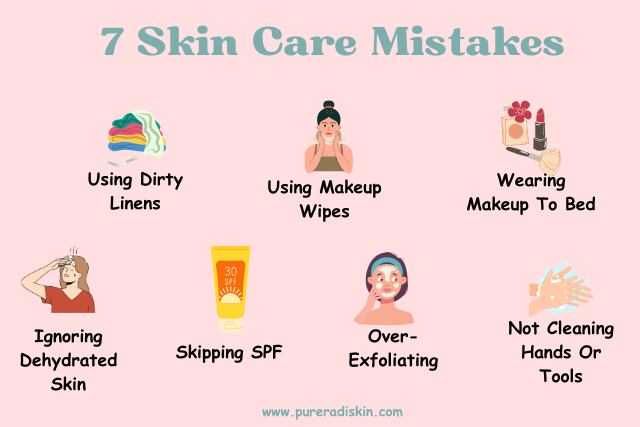
Sleeping With Makeup On
Many people sleep with makeup on. This habit can harm your skin. Skipping proper makeup removal can lead to various skin issues. Learn why this mistake should be avoided and how to remove makeup effectively.
Skin Health Impact
Sleeping with makeup can clog your pores. Clogged pores cause acne and blackheads. Makeup residue can lead to skin irritation. Your skin needs to breathe at night. Makeup prevents this, leading to unhealthy skin. Over time, this can speed up aging.
Here are some common impacts on skin health:
Impact | Description |
|---|---|
Acne | Clogged pores cause breakouts and blemishes. |
Premature Aging | Makeup residue speeds up the aging process. |
Irritation | Skin becomes red and inflamed. |
Dullness | Skin loses its natural glow. |
Effective Makeup Removal
Removing makeup properly is crucial for healthy skin. Use gentle cleansers to remove makeup. Avoid harsh scrubbing, as it can irritate the skin. Follow these steps for effective makeup removal:
Use a makeup remover or micellar water.
Gently wipe your face with a cotton pad.
Rinse with lukewarm water.
Use a mild face wash to cleanse your skin.
Pat your face dry with a clean towel.
Apply a moisturizer to keep your skin hydrated.
Here are some tips to make the process easier:
Keep makeup remover wipes by your bed.
Use products suitable for your skin type.
Never skip the cleansing step.
Following these steps ensures your skin stays healthy and fresh. Always remove your makeup before sleeping. Your skin will thank you!
Neglecting Patch Tests
Neglecting patch tests can lead to serious skin issues. Many people skip this crucial step. They then suffer from rashes, irritation, and even allergic reactions. A patch test helps identify if a product is safe for your skin. Let’s explore why it’s essential and how to do it properly.
Allergic Reactions
Allergic reactions can cause red, itchy, and swollen skin. In severe cases, blisters and hives may appear. Using new products without a patch test increases these risks.
Symptoms | Description |
|---|---|
Redness | Skin turns red and feels warm. |
Itching | Uncontrollable urge to scratch the skin. |
Swelling | Skin becomes puffy and inflamed. |
Blisters | Small fluid-filled bumps on the skin. |
Hives | Raised, red, and itchy welts. |
Patch Test Procedure
Follow these steps to conduct a patch test:
Choose a small area of skin, like your forearm.
Apply a small amount of the product to this area.
Wait for 24 to 48 hours without washing off.
Observe any changes or reactions on your skin.
If you notice any adverse reactions, do not use the product.
Always perform a patch test before using new skincare items. This simple step can save your skin from many problems.
Incorrect Product Layering
Incorrect product layering can harm your skin. Applying products in the wrong order can reduce their effectiveness. Let’s explore how to layer products correctly.
Layering Order
Understanding the correct layering order is crucial. Here is a simple guide:
Step | Product |
|---|---|
1 | Cleanser |
2 | Toner |
3 | Serum |
4 | Moisturizer |
5 | Sunscreen |
Always start with the lightest products. End with heavier products like moisturizers.
Maximizing Product Efficacy
Maximize product efficacy by using them correctly. Follow these tips:
Apply serums before moisturizers.
Use sunscreen as the last step in the morning.
Allow each product to absorb before applying the next.
This ensures each product works effectively. Always read instructions carefully. Patience is key for skincare routines.

Frequently Asked Questions
What Are Common Skincare Mistakes?
Common skincare mistakes include over-exfoliating, using harsh products, and neglecting sunscreen. These can damage your skin barrier and cause irritation.
How Often Should You Exfoliate?
Exfoliate 1-2 times a week. Over-exfoliation can lead to redness and sensitivity. Listen to your skin’s needs.
Why Is Sunscreen Important?
Sunscreen protects against harmful UV rays, preventing premature aging and reducing the risk of skin cancer. Always wear SPF 30 or higher.
Can I Sleep With Makeup On?
Sleeping with makeup on can clog pores and cause breakouts. Always remove makeup before bed to keep your skin healthy.
Lastly
Avoiding common skincare mistakes is crucial for maintaining healthy skin. Always choose products suited to your skin type. Consistency in your routine makes a big difference. Protect your skin from the sun every day. By following these tips, you can enjoy clearer, more radiant skin.
Prioritize your skin’s health for lasting beauty.

